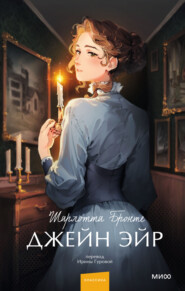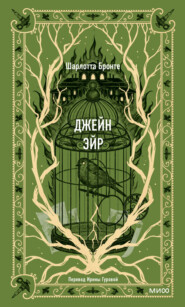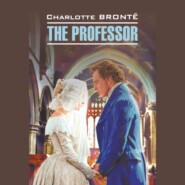По всем вопросам обращайтесь на: info@litportal.ru
(©) 2003-2024.
✖
Jane Eyre
Настройки чтения
Размер шрифта
Высота строк
Поля
How dare I, Mrs. Reed? How dare I? Because it is the truth
Ere I had finished this reply, my soul began to expand, to exult, with the strangest sense of freedom, of triumph, I ever felt. It seemed as if an invisible bond had burst, and that I had struggled out into unhoped-for liberty. Not without cause was this sentiment: Mrs. Reed looked frightened; her work had slipped from her knee; she was lifting up her hands, rocking herself to and fro, and even twisting her face as if she would cry.
“Jane, you are under a mistake: what is the matter with you? Why do you tremble so violently? Would you like to drink some water?”
“No, Mrs. Reed.”
“Is there anything else you wish for, Jane? I assure you, I desire to be your friend.”
“Not you. You told Mr. Brocklehurst I had a bad character, a deceitful disposition; and I’ll let everybody at Lowood know what you are, and what you have done.”
“Jane, you don’t understand these things: children must be corrected for their faults.”
“Deceit is not my fault!” I cried out in a savage, high voice.
“But you are passionate, Jane, that you must allow: and now return to the nursery-there’s a dear-and lie down a little.”
“I am not your dear; I cannot lie down: send me to school soon, Mrs. Reed, for I hate to live here.”
“I will indeed send her to school soon,” murmured Mrs. Reed sotto voce; and gathering up her work, she abruptly quitted the apartment.
I was left there alone-winner of the field. It was the hardest battle I had fought, and the first victory I had gained: I stood awhile on the rug, where Mr. Brocklehurst had stood, and I enjoyed my conqueror’s solitude. First, I smiled to myself and felt elate; but this fierce pleasure subsided in me as fast as did the accelerated throb of my pulses. A child cannot quarrel with its elders, as I had done; cannot give its furious feelings uncontrolled play, as I had given mine, without experiencing afterwards the pang of remorse and the chill of reaction. A ridge of lighted heath, alive, glancing, devouring, would have been a meet emblem of my mind when I accused and menaced Mrs. Reed: the same ridge, black and blasted after the flames are dead, would have represented as meetly my subsequent condition, when half-an-hour’s silence and reflection had shown me the madness of my conduct, and the dreariness of my hated and hating position.
Something of vengeance I had tasted for the first time; as aromatic wine it seemed, on swallowing, warm and racy: its after-flavour, metallic and corroding, gave me a sensation as if I had been poisoned. Willingly would I now have gone and asked Mrs. Reed’s pardon; but I knew, partly from experience and partly from instinct, that was the way to make her repulse me with double scorn, thereby re-exciting every turbulent impulse of my nature.
I would fain exercise some better faculty than that of fierce speaking; fain find nourishment for some less fiendish feeling than that of sombre indignation. I took a book-some Arabian tales; I sat down and endeavoured to read. I could make no sense of the subject; my own thoughts swam always between me and the page I had usually found fascinating. I opened the glass-door in the breakfast-room: the shrubbery was quite still: the black frost reigned, unbroken by sun or breeze, through the grounds. I covered my head and arms with the skirt of my frock, and went out to walk in a part of the plantation which was quite sequestrated; but I found no pleasure in the silent trees, the falling fir-cones, the congealed relics of autumn, russet leaves, swept by past winds in heaps, and now stiffened together. I leaned against a gate, and looked into an empty field where no sheep were feeding, where the short grass was nipped and blanched. It was a very grey day; a most opaque sky, “onding on snaw,” canopied all; thence flakes fell at intervals, which settled on the hard path and on the hoary lea without melting. I stood, a wretched child enough, whispering to myself over and over again, “What shall I do? – what shall I do?”
All at once I heard a clear voice call, “Miss Jane! where are you? Come to lunch!”
It was Bessie, I knew well enough; but I did not stir; her light step came tripping down the path.
“You naughty little thing!” she said. “Why don’t you come when you are called?”
Bessie’s presence, compared with the thoughts over which I had been brooding, seemed cheerful; even though, as usual, she was somewhat cross. The fact is, after my conflict with and victory over Mrs. Reed, I was not disposed to care much for the nursemaid’s transitory anger; and I was disposed to bask in her youthful lightness of heart. I just put my two arms round her and said, “Come, Bessie! don’t scold.”
The action was more frank and fearless than any I was habituated to indulge in: somehow it pleased her.
“You are a strange child, Miss Jane,” she said, as she looked down at me; “a little roving, solitary thing: and you are going to school, I suppose?”
I nodded.
“And won’t you be sorry to leave poor Bessie?”
“What does Bessie care for me? She is always scolding me.”
“Because you’re such a queer, frightened, shy little thing. You should be bolder.”
“What! to get more knocks?”
“Nonsense! But you are rather put upon, that’s certain. My mother said, when she came to see me last week, that she would not like a little one of her own to be in your place.-Now, come in, and I’ve some good news for you.”
“I don’t think you have, Bessie.”
“Child! what do you mean? What sorrowful eyes you fix on me! Well, but Missis and the young ladies and Master John are going out to tea this afternoon, and you shall have tea with me. I’ll ask cook to bake you a little cake, and then you shall help me to look over your drawers; for I am soon to pack your trunk. Missis intends you to leave Gateshead in a day or two, and you shall choose what toys you like to take with you.”
“Bessie, you must promise not to scold me any more till I go.”
“Well, I will; but mind you are a very good girl, and don’t be afraid of me. Don’t start when I chance to speak rather sharply; it’s so provoking.”
“I don’t think I shall ever be afraid of you again, Bessie, because I have got used to you, and I shall soon have another set of people to dread.”
“If you dread them they’ll dislike you.”
“As you do, Bessie?”
“I don’t dislike you, Miss; I believe I am fonder of you than of all the others.”
“You don’t show it.”
“You little sharp thing! you’ve got quite a new way of talking. What makes you so venturesome and hardy?”
“Why, I shall soon be away from you, and besides”-I was going to say something about what had passed between me and Mrs. Reed, but on second thoughts I considered it better to remain silent on that head.
“And so you’re glad to leave me?”
“Not at all, Bessie; indeed, just now I’m rather sorry.”
“Just now! and rather! How coolly my little lady says it! I dare say now if I were to ask you for a kiss you wouldn’t give it me: you’d say you’d rather not.”
“I’ll kiss you and welcome: bend your head down.” Bessie stooped; we mutually embraced, and I followed her into the house quite comforted. That afternoon lapsed in peace and harmony; and in the evening Bessie told me some of her most enchanting stories, and sang me some of her sweetest songs. Even for me life had its gleams of sunshine.
Chapter V
Five o’clock had hardly struck on the morning of the 19th of January, when Bessie brought a candle into my closet and found me already up and nearly dressed. I had risen half-an-hour before her entrance, and had washed my face, and put on my clothes by the light of a half-moon just setting, whose rays streamed through the narrow window near my crib. I was to leave Gateshead that day by a coach which passed the lodge gates at six A.M. Bessie was the only person yet risen; she had lit a fire in the nursery, where she now proceeded to make my breakfast. Few children can eat when excited with the thoughts of a journey; nor could I. Bessie, having pressed me in vain to take a few spoonfuls of the boiled milk and bread she had prepared for me, wrapped up some biscuits in a paper and put them into my bag; then she helped me on with my pelisse and bonnet, and wrapping herself in a shawl, she and I left the nursery. As we passed Mrs. Reed’s bedroom, she said, “Will you go in and bid Missis good-bye?”
“No, Bessie: she came to my crib last night when you were gone down to supper, and said I need not disturb her in the morning, or my cousins either; and she told me to remember that she had always been my best friend, and to speak of her and be grateful to her accordingly.”
“What did you say, Miss?”
“Nothing: I covered my face with the bedclothes, and turned from her to the wall.”
“That was wrong, Miss Jane.”
“It was quite right, Bessie. Your Missis has not been my friend: she has been my foe.”
“O Miss Jane! don’t say so!”
“Good-bye to Gateshead!” cried I, as we passed through the hall and went out at the front door.
Ere I had finished this reply, my soul began to expand, to exult, with the strangest sense of freedom, of triumph, I ever felt. It seemed as if an invisible bond had burst, and that I had struggled out into unhoped-for liberty. Not without cause was this sentiment: Mrs. Reed looked frightened; her work had slipped from her knee; she was lifting up her hands, rocking herself to and fro, and even twisting her face as if she would cry.
“Jane, you are under a mistake: what is the matter with you? Why do you tremble so violently? Would you like to drink some water?”
“No, Mrs. Reed.”
“Is there anything else you wish for, Jane? I assure you, I desire to be your friend.”
“Not you. You told Mr. Brocklehurst I had a bad character, a deceitful disposition; and I’ll let everybody at Lowood know what you are, and what you have done.”
“Jane, you don’t understand these things: children must be corrected for their faults.”
“Deceit is not my fault!” I cried out in a savage, high voice.
“But you are passionate, Jane, that you must allow: and now return to the nursery-there’s a dear-and lie down a little.”
“I am not your dear; I cannot lie down: send me to school soon, Mrs. Reed, for I hate to live here.”
“I will indeed send her to school soon,” murmured Mrs. Reed sotto voce; and gathering up her work, she abruptly quitted the apartment.
I was left there alone-winner of the field. It was the hardest battle I had fought, and the first victory I had gained: I stood awhile on the rug, where Mr. Brocklehurst had stood, and I enjoyed my conqueror’s solitude. First, I smiled to myself and felt elate; but this fierce pleasure subsided in me as fast as did the accelerated throb of my pulses. A child cannot quarrel with its elders, as I had done; cannot give its furious feelings uncontrolled play, as I had given mine, without experiencing afterwards the pang of remorse and the chill of reaction. A ridge of lighted heath, alive, glancing, devouring, would have been a meet emblem of my mind when I accused and menaced Mrs. Reed: the same ridge, black and blasted after the flames are dead, would have represented as meetly my subsequent condition, when half-an-hour’s silence and reflection had shown me the madness of my conduct, and the dreariness of my hated and hating position.
Something of vengeance I had tasted for the first time; as aromatic wine it seemed, on swallowing, warm and racy: its after-flavour, metallic and corroding, gave me a sensation as if I had been poisoned. Willingly would I now have gone and asked Mrs. Reed’s pardon; but I knew, partly from experience and partly from instinct, that was the way to make her repulse me with double scorn, thereby re-exciting every turbulent impulse of my nature.
I would fain exercise some better faculty than that of fierce speaking; fain find nourishment for some less fiendish feeling than that of sombre indignation. I took a book-some Arabian tales; I sat down and endeavoured to read. I could make no sense of the subject; my own thoughts swam always between me and the page I had usually found fascinating. I opened the glass-door in the breakfast-room: the shrubbery was quite still: the black frost reigned, unbroken by sun or breeze, through the grounds. I covered my head and arms with the skirt of my frock, and went out to walk in a part of the plantation which was quite sequestrated; but I found no pleasure in the silent trees, the falling fir-cones, the congealed relics of autumn, russet leaves, swept by past winds in heaps, and now stiffened together. I leaned against a gate, and looked into an empty field where no sheep were feeding, where the short grass was nipped and blanched. It was a very grey day; a most opaque sky, “onding on snaw,” canopied all; thence flakes fell at intervals, which settled on the hard path and on the hoary lea without melting. I stood, a wretched child enough, whispering to myself over and over again, “What shall I do? – what shall I do?”
All at once I heard a clear voice call, “Miss Jane! where are you? Come to lunch!”
It was Bessie, I knew well enough; but I did not stir; her light step came tripping down the path.
“You naughty little thing!” she said. “Why don’t you come when you are called?”
Bessie’s presence, compared with the thoughts over which I had been brooding, seemed cheerful; even though, as usual, she was somewhat cross. The fact is, after my conflict with and victory over Mrs. Reed, I was not disposed to care much for the nursemaid’s transitory anger; and I was disposed to bask in her youthful lightness of heart. I just put my two arms round her and said, “Come, Bessie! don’t scold.”
The action was more frank and fearless than any I was habituated to indulge in: somehow it pleased her.
“You are a strange child, Miss Jane,” she said, as she looked down at me; “a little roving, solitary thing: and you are going to school, I suppose?”
I nodded.
“And won’t you be sorry to leave poor Bessie?”
“What does Bessie care for me? She is always scolding me.”
“Because you’re such a queer, frightened, shy little thing. You should be bolder.”
“What! to get more knocks?”
“Nonsense! But you are rather put upon, that’s certain. My mother said, when she came to see me last week, that she would not like a little one of her own to be in your place.-Now, come in, and I’ve some good news for you.”
“I don’t think you have, Bessie.”
“Child! what do you mean? What sorrowful eyes you fix on me! Well, but Missis and the young ladies and Master John are going out to tea this afternoon, and you shall have tea with me. I’ll ask cook to bake you a little cake, and then you shall help me to look over your drawers; for I am soon to pack your trunk. Missis intends you to leave Gateshead in a day or two, and you shall choose what toys you like to take with you.”
“Bessie, you must promise not to scold me any more till I go.”
“Well, I will; but mind you are a very good girl, and don’t be afraid of me. Don’t start when I chance to speak rather sharply; it’s so provoking.”
“I don’t think I shall ever be afraid of you again, Bessie, because I have got used to you, and I shall soon have another set of people to dread.”
“If you dread them they’ll dislike you.”
“As you do, Bessie?”
“I don’t dislike you, Miss; I believe I am fonder of you than of all the others.”
“You don’t show it.”
“You little sharp thing! you’ve got quite a new way of talking. What makes you so venturesome and hardy?”
“Why, I shall soon be away from you, and besides”-I was going to say something about what had passed between me and Mrs. Reed, but on second thoughts I considered it better to remain silent on that head.
“And so you’re glad to leave me?”
“Not at all, Bessie; indeed, just now I’m rather sorry.”
“Just now! and rather! How coolly my little lady says it! I dare say now if I were to ask you for a kiss you wouldn’t give it me: you’d say you’d rather not.”
“I’ll kiss you and welcome: bend your head down.” Bessie stooped; we mutually embraced, and I followed her into the house quite comforted. That afternoon lapsed in peace and harmony; and in the evening Bessie told me some of her most enchanting stories, and sang me some of her sweetest songs. Even for me life had its gleams of sunshine.
Chapter V
Five o’clock had hardly struck on the morning of the 19th of January, when Bessie brought a candle into my closet and found me already up and nearly dressed. I had risen half-an-hour before her entrance, and had washed my face, and put on my clothes by the light of a half-moon just setting, whose rays streamed through the narrow window near my crib. I was to leave Gateshead that day by a coach which passed the lodge gates at six A.M. Bessie was the only person yet risen; she had lit a fire in the nursery, where she now proceeded to make my breakfast. Few children can eat when excited with the thoughts of a journey; nor could I. Bessie, having pressed me in vain to take a few spoonfuls of the boiled milk and bread she had prepared for me, wrapped up some biscuits in a paper and put them into my bag; then she helped me on with my pelisse and bonnet, and wrapping herself in a shawl, she and I left the nursery. As we passed Mrs. Reed’s bedroom, she said, “Will you go in and bid Missis good-bye?”
“No, Bessie: she came to my crib last night when you were gone down to supper, and said I need not disturb her in the morning, or my cousins either; and she told me to remember that she had always been my best friend, and to speak of her and be grateful to her accordingly.”
“What did you say, Miss?”
“Nothing: I covered my face with the bedclothes, and turned from her to the wall.”
“That was wrong, Miss Jane.”
“It was quite right, Bessie. Your Missis has not been my friend: she has been my foe.”
“O Miss Jane! don’t say so!”
“Good-bye to Gateshead!” cried I, as we passed through the hall and went out at the front door.

















